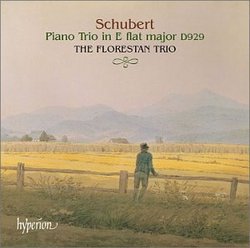Schubert's lyrical genius
Daniel R. Greenfield | Milwaukee, Wisconsin, United States | 07/20/2004
(5 out of 5 stars)
"This beautiful album showcases the lyrical genius of Franz Schubert. I have listened to classical music for years, but up until I purchased this album I had never given Schubert a fair hearing. But now, having heard his music, and become thorougly overwhelmed by his genius, I can only stand in awe of him, much as I have already done by Mozart.
Schubert apparently wrestled with this piano trio for a long time, repeatedly tearing up his work and starting over, so unworthy and incapable did he feel himself to be writing anything that might be able to be even half as good as Beethoven's Archduke Trio. The question for Schubert, as for many other composers of that era was simply, how could they push forward into any new musical frontier, after Beethoven? Schubert, however, succeeded in forging a uniquely personal and lyrical style of his own: a clear lyrical line, sensitive, hopeful, sometimes passionate, sort of a very unique synthesis between Mozart and Beethoven.
Like Proust, he wrote on a grand scale, not knowing when to stop; the music just flows on and on, endlessly inventive. The critics said it was too long to sit through. As a result of this criticism, Schubert cut sections out of the final movement. (Fortunately, in this recording we are given both versions of the last movement.)
All I can tell you is, buy this album, listen to it. Give it a hearing, and you will fall in love with this composer. And as for the Florestan Trio's performance on this recording, all I have is praise; it is simply flawless. The sound quality is also superlative. This is a must-have album. No matter how many classical albums you own, this will easily become one of your favorites."
OUTSTANDING!
Sam | Seahurst, Washington | 11/27/2007
(5 out of 5 stars)
"The Florestan Tio follow up their outstanding account of Schubert's B flat major Trio with another memorable performance of the more profound, yet still often light-hearted, E flat Trio, written in the same month in which Schubert completed "Winterreise." If once again the playing of the pianist, Susan Tomes, stands out, the cellist's Richard Lester's contribution is hardly less memorable. As before, the recording is completely lifelike and very well balanced, catching the widest range of dynamic with naturalness and fidelity. As a bonus we are additionally offered Schubert's original finale, nearly two minutes longer without the two cuts in the development made by the composer, totalling 98 bars."

